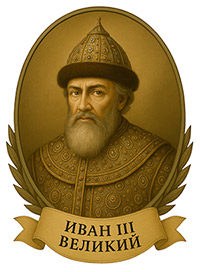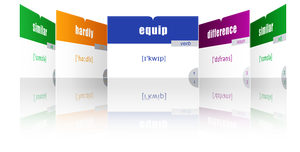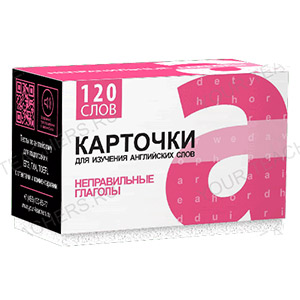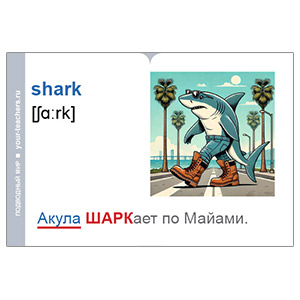История России. Рюрики. 36 ИВАН ВЕЛИКИЙ
- Подробности
- 1345
На этой странице вы ознакомитесь с основными фактами о ИВАНЕ III ВАСИЛЬЕВИЧЕ (ВЕЛИКОМ). Текст озвучен. Даны ключевые слова для запоминания. После изучения текста вы можете проверить себя, чтобы убедиться в понимании материала.

| № | Английский | Русский |
|---|---|---|
| 1 | Ivan III Vasilyevich, nicknamed “The Great,” was born in 1440 and lived 65 years (1462–1505, 43 years) — Grand Duke of Moscow and the first sovereign of all Rus’, son of Vasily the Dark and great-grandson of Dmitry Donskoy. | Иван III Васильевич, по прозвищу «Великий», родился в 1440 году, прожил 65 лет (1462–1505, 43 года) — великий князь Московский и первый государь всея Руси, сын Василия Тёмного и правнук Дмитрия Донского. |
| 2 | The first Grand Duke to be called a Tsar. | Первый великий князь, которого начали называть царём. |
| 3 | The Tsar differs from a prince in that he is the supreme ruler and is subordinate to no one. | Царь отличается от князя тем, что является верховным правителем и никому не подчиняется. |
| 4 | Ivan III is known as the “gatherer of Russian lands.” He refused to pay tribute to the Mongols and freed the country from the Mongol-Tatar yoke during the “Standoff on the Ugra” in 1480. | Ивана III называют «собирателем Русской земли». Он отказался платить дань монголам и освободил страну от монголо-татарского ига во время «Стояния на Угре» в 1480 году. |
| 5 | Horde Khan Akhmat allied with the Polish king Casimir IV and led his army toward Moscow. | Хан Ахмат из Орды заключил союз с польским королём Казимиром IV и направил своё войско на Москву. |
| 6 | The enemy forces reached the Ugra River but did not dare to cross it and confront the Russian army. | Вражеские войска дошли до реки Угры, но не осмелились переправиться и сразиться с русской армией. |
| 7 | This marked the end of the Mongol yoke. | Так завершилось монголо-татарское иго. |
| 8 | Shortly before his reign, the Byzantine Empire fell in 1453. | Незадолго до его правления, в 1453 году, пала Византийская империя. |
| 9 | The Turks captured Constantinople. | Турки захватили Константинополь. |
| 10 | The Moscow Orthodox state became the successor of Byzantium. | Московское православное государство стало преемником Византии. |
| 11 | Under him, the Principality of Moscow turned into a centralized state. | При нём Московское княжество превратилось в централизованное государство. |
| 12 | Ivan III finally subjugated Novgorod, Pskov, Tver, Yaroslavl and Ryazan. | Иван III окончательно подчинил Новгород, Псков, Тверь, Ярославль и Рязань. |
| 13 | He married Sophia Palaiologos — niece of the last Byzantine emperor Constantine XI. | Он женился на Софье Палеолог — племяннице последнего византийского императора Константина XI. |
| 14 | The double-headed eagle of the Palaiologos complemented the emblem of Moscow — St. George slaying the dragon — and became the Russian coat of arms. | Двуглавый орёл Палеологов дополнил герб Московского княжества — изображение Георгия Победоносца, поражающего змея — и стал гербом России. |
| 15 | Sophia contributed to the introduction of European culture to Rus'. | Софья способствовала приобщению Руси к европейской культуре. |
| 16 | Now we would say “in the good sense of the word.” | Сейчас хочется сказать — «в хорошем смысле этого слова». |
| 17 | Under him, the legal code “Sudebnik” was adopted, chronicle writing flourished, and the Assumption Cathedral of the Kremlin was rebuilt. | При Иване III был принят Судебник, летописание расцвело, был перестроен Успенский собор Кремля. |
| 18 | Ivan III united nearly all Russian principalities under his rule. | Иван III объединил под своей властью почти все русские княжества. |
| 19 | In his time, a cannon foundry was established in Moscow and guns began to be produced. | При нём в Москве построили пушечный двор и начали лить пушки. |
| 20 | A merchant from Tver, Afanasy Nikitin, made a journey to India. | Купец из Твери Афанасий Никитин совершил путешествие в Индию. |
| 21 | He described his journey in the book “Journey Beyond Three Seas.” | Он описал своё путешествие в книге «Хождение за три моря». |
| 22 | A monument to him stands in Feodosia, near the church he regularly attended for worship. | Памятник Афанасию Никитину установлен в Феодосии у церкви, в которую он регулярно ходил на богослужения. |
| 23 | Consolidating power, Ivan III ruled harshly, regardless of the boyars' rights. | Сконцентрировав власть, Иван III правил жестко, не считаясь с правами бояр. |
| 24 | He died in 1505 in Moscow due to the consequences of a stroke. | Он умер в 1505 году в Москве от последствий инсульта. |
ПРОСЛУШАЙТЕ ТЕКСТ
КЛЮЧЕВЫЕ СЛОВА:
ПРОВЕРЬ СЕБЯ:
1. When was Ivan III born?
2. What was his nickname?
3. Who was the first Grand Duke called Tsar?
4. What is the difference between a tsar and a prince?
5. What title did Ivan III earn for unifying lands?
6. What event ended Mongol rule?
7. Who was the Horde khan that marched on Moscow?
8. What did enemy forces fail to cross?
9. What empire fell in 1453?
10. Who captured Constantinople?
11. Who became Byzantium’s successor?
12. What did Moscow become under Ivan III?
13. What cities did he subjugate?
14. Who was Ivan III’s wife?
15. What symbol did she bring to Russia?
16. What culture did Sophia introduce?
17. What legal code did Ivan III adopt?
18. What cathedral was rebuilt?
19. What did Ivan III unify?
20. What was built for cannon production?
21. Who traveled to India?
22. What book did he write?
23. Where is his monument located?
24. How did Ivan III die?
ПРОСЛУШАЙТЕ ТЕКСТ








 Как правильно изучать английский язык по карточкам (статьи)
Как правильно изучать английский язык по карточкам (статьи)